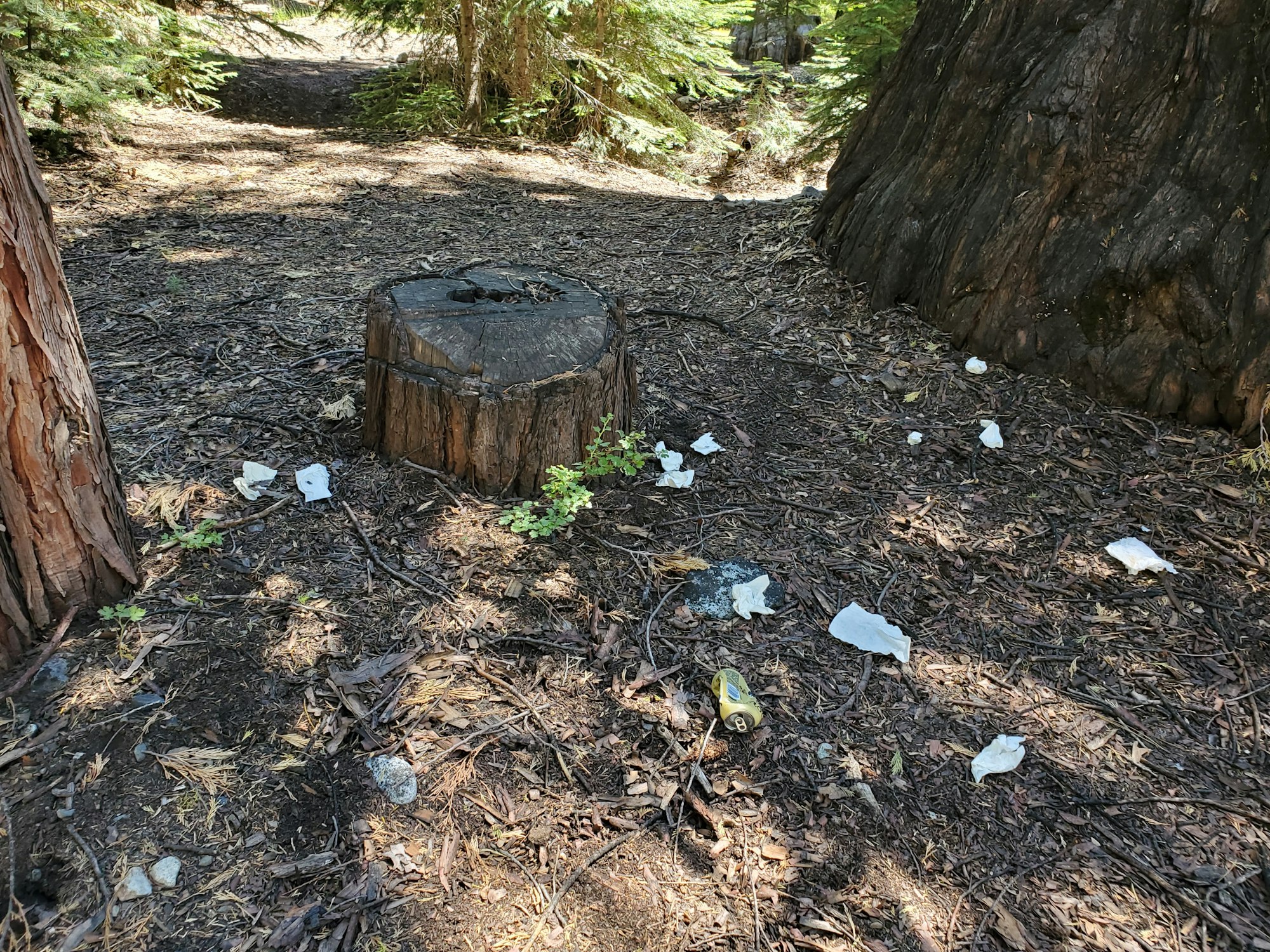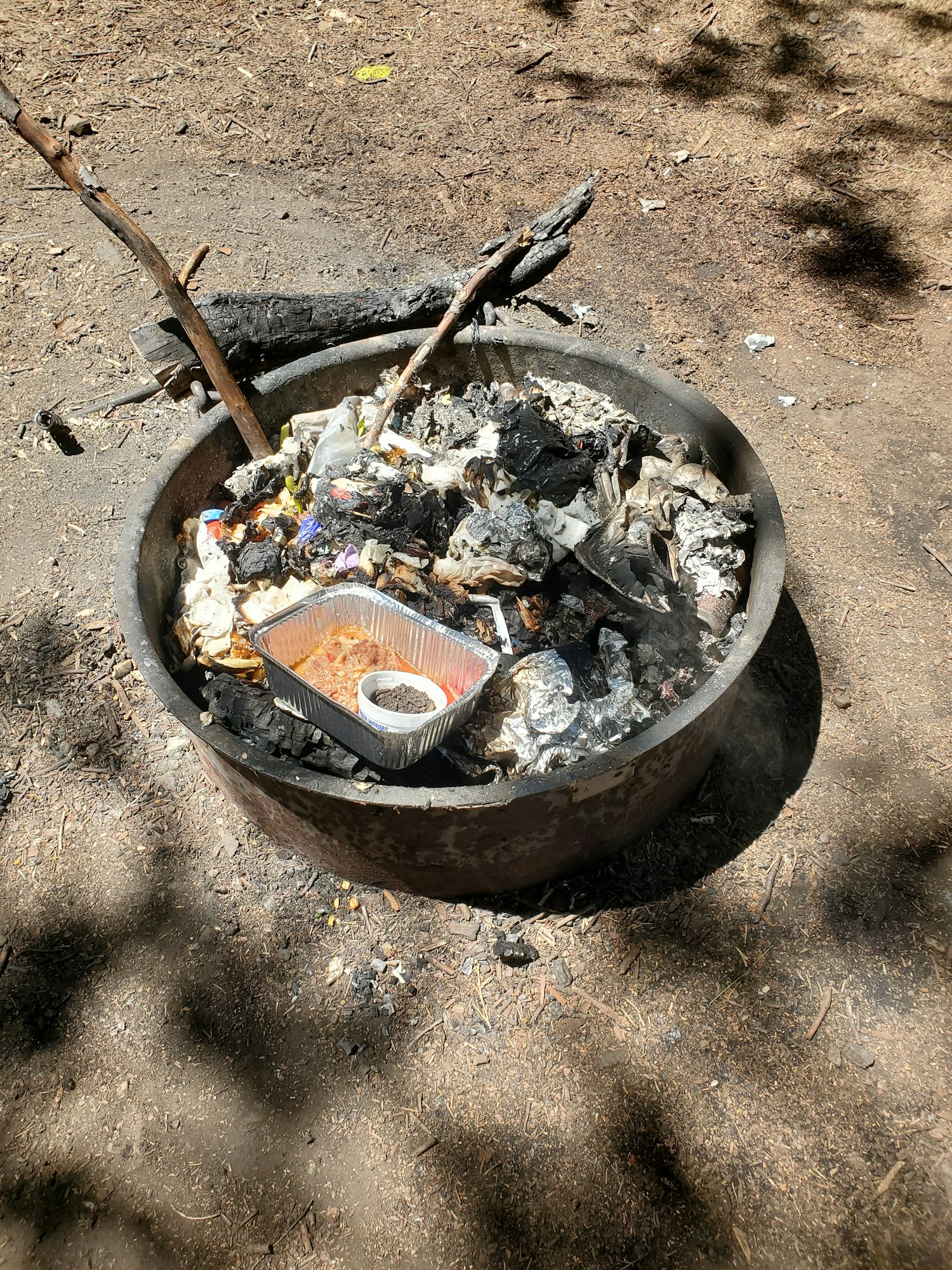Stern reminder: pack it in, pack it out
Dispersed camping posing health and wildfire risks in local Sierra
(Grass Valley Aug. 3, 2023) The good news: the Bowman corridor in the beautiful Sierra is now accessible to the public for camping and recreation.
The bad news: trash, abandoned food and smoldering campfires pose a serious threat to public health and wildfire risk.
Dispersed camping is the term used for camping outside of an organized, hosted campground. This type of camping means no services, such as trash removal. Located throughout the Bowman area (Bowman Lake to Faucherie Campground), dispersed camping is available on a first-come, first-serve basis.
The camping sites are on federal land, as well as around reservoirs owned and maintained by the Nevada Irrigation District (NID).

NID, which routinely has a crew working at its upper division reservoirs, is issuing a stern reminder to visitors: pack it in, pack it out.
“It is sad and alarming what our crew is finding, especially after weekends. The amount of garbage, used toilet paper, and uneaten food is shocking,” said NID Director of Recreation Monica Reyes. “Most dangerous are the smoldering campfires left in fire rings. This is absolutely unacceptable.”
Because there are no janitors or regular patrols -- county, federal or NID -- around dispersed camping sites, visitors have added responsibility. Their actions have real consequences, good and especially bad.
The “pack it in, pack it out” mantra is important. The message is simple: whatever you bring in, you are responsible for bringing out.
Beyond the unsightliness of trash on the ground, leftover food is an attraction for bears. Once a wild animal gets used to the taste of human food, they are more likely to aggressively seek that food and be drawn to people so that they become a safety hazard.

Importantly, the natural environment and local communities depend on campers tending their campfires. Statistics show that more than 80 percent of wildfires are human-related. A fire that is not attended to can quickly start to burn out of control. Even ashes and embers can spark and start a fire. Embers can remain hot and dangerous up to 12 hours after a fire has been put out.
Also, on the grander scale, recreating around Bowman Lake is in the heart of the Sierra headwaters that provide the water most Californians use and drink. Healthy watersheds and forests are important to slow the rate of climate change. Keeping these watersheds safe and unpolluted are key to our future.
“Treat NID’s upper division, the headwaters, like the care you take in your own home. The actions you take have impacts,” Reyes said. “Here’s a call out to all who are planning to venture to remote reservoirs or dispersed camping. You absolutely must be mindful of your impact on the land. Think about the experiences of those around you or those who will be camping right after you. Most of all, consider the dangers you create and the harm you do,” Reyes said.
xxx
You make a difference. This is from the non-profit Leave No Trace:
The waste humans create while enjoying outdoor spaces can have severe impacts if not disposed of properly. It is crucial to anticipate the types of waste you will need to dispose of and know the proper techniques for disposing of each type of waste in the area you are visiting.
Leave No Trace encourages outdoor enthusiasts to consider the impacts they leave behind, which will undoubtedly affect the health and safety of other campers, the environment, the water, and wildlife.
The Basics:
- Pack it in, pack it out. Inspect your campsite and rest areas for trash or spilled food. Pack out all trash, leftover food, and litter. Burning trash is never recommended.
- Deposit solid human waste in catholes dug 6-8 inches deep at least 200 feet from water, camp, and trails. Cover and disguise the cathole when finished.
- Bury toilet paper deep in a cathole or pack the toilet paper out along with hygiene products.
- To wash yourself or your dishes, carry water 200 feet away from streams or lakes and use small amounts of biodegradable soap. Scatter strained dishwater.
Leave No Trace is a non-profit organization that’s committed to protecting the planet by providing science, research and simple guidelines.
